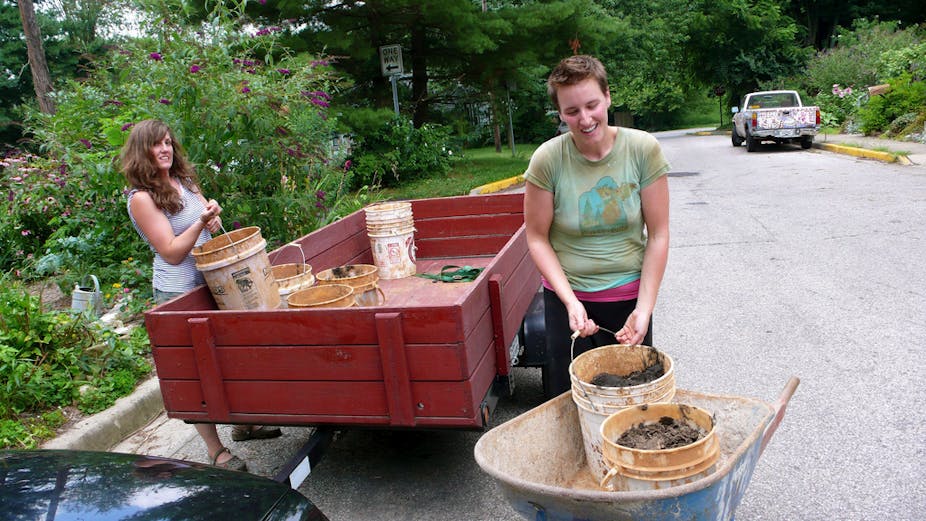Without phosphorus we cannot produce food. Yet even as pressure mounts on this critical non-renewable resource, there is a startling lack of global governance of its use and supply. If no one takes responsibility for ensuring phosphorus security, we can expect it will one day run out.
It took 20 years between the discovery of ozone depletion and international policy action to ban ozone-depleting substances via The Montreal Protocol. Phosphorus scarcity is one of the newest global threats – but will we have to wait 20 years to see policy change in response to this emerging challenge? How long can we wait? The 3rd Sustainable Phosphorus Summit in Sydney starting February 29 will address such questions and formulate a blueprint for action.
Global phosphorus scarcity could seriously threaten the ability of Australia and the world to feed itself in the future. Based on our research, the production of phosphorus is expected to peak some time this century, possibly before 2040.
Phosphorus is a bedrock of food production, yet at a government level there is no international action to ensure the world will have sufficient access to phosphorus for long-term food security.

Phosphorus once went into the food system in the excreta of animals - their manure went on to fields where it fertilised crops. These were eaten and the phosphorus stayed in the cycle. But now humans have disrupted this once-closed phosphorus biogeochemical cycle. Our large-scale agriculture focuses either on crops or on animals and the two are rarely mixed. That means no more manure where it’s needed. Instead, we use phosphate rock, and phosphates move essentially in a one-way direction from mines through food systems to the oceans.
Global agriculture is primarily dependent on one source: non-renewable phosphate rock. The latest statistics suggest that one country, Morocco, controls 85% of the world’s remaining high-grade phosphate rock. Even a temporary disruption to the supply of phosphate on the world market can have serious ramifications for nations’ food security.
The phosphorus cycle is not only broken physically, but institutionally. All the phosphorus in the food that we eat comes out the other end in our urine and faeces, but institutionally there is a vast disconnect between the food and sanitation sectors. In fact, no sector in our economy has taken responsibility for ensuring phosphorus security for food production.
Phosphorus security means ensuring all farmers have sufficient access to phosphorus to produce enough food to feed the world – not just those farmers that can afford increasingly expensive fertilisers.
People are becoming more aware of this serious global sustainability challenge. An 800% price spike in phosphate rock in 2008, driven by increased demand (including from increased use of animal products in diet, and biofuels) prior to the global financial crisis, certainly raised awareness. The price did not return to pre-2008 levels and is trending back upwards.
Researchers are forming new global and national platforms, such as the Global Phosphorus Research Initiative and the Dutch Nutrient Platform. But no international body - not even the UN – is taking an active role in developing appropriate policies to make sure we can get phosphorus and grow food into the future.
There are many areas of debate and lack of consensus. There isn’t agreement on how long global phosphate rock reserves will last; estimates range from decades to centuries. There is controversy over the ownership of vast phosphate rock reserves in Western Sahara (currently controlled by the Moroccan Royal Family), and even the magnitude of future phosphate demand.
But regardless of these sticking points, we know there is a serious problem and we know we need to substantially increase phosphorus recycling and efficiency in the food system to avert a crisis for global phosphorus security.
Some innovations exist. Some researchers are converting human excreta and wastewater to marketable phosphate fertilisers like struvite. Others are developing guidelines for efficient use of phosphorus in agriculture. But how do we make these innovations mainstream? How long will it take to see international and national policy responses to effectively implement these changes?
There is an ambiguity of roles and absence of responsibilities among those who should be leading the charge on phosphorus security. These include the UN’s FAO and UNEP, the fertiliser industry and national governments. By default the market is governing global phosphate resources. But the market alone can’t solve the problem in a sustainable, equitable, and timely manner.
Decision-makers must develop new sustainable policies, partnerships and strategic frameworks to stimulate and support the development of renewable phosphorus fertilisers and their efficient use and equitable access by all the world’s farmers.
Do we need national phosphorus recovery targets? Subsidies on renewable phosphate fertilisers? Phosphorus use cap and trade schemes? Education schemes like “meat-free Mondays” to reduce our global impact on the phosphorus cycle?

Perhaps it’s high time to form an Intergovernmental Panel on Phosphorus Security.
The delegates of the 3rd Sustainable Phosphorus Summit will develop a Blueprint for Global Phosphorus Security across the three days which will table a plan for priority research and policy action. This Blueprint will be used to influence policy, setting research directions and informing decision-makers.
Follow the activities and outcomes at the 3rd Sustainable Phosphorus Summit in Sydney.
Watch an exclusive interview with Professor Paul Crutzen (Nobel Prize laureate in Chemistry).
The Institute for Sustainable Futures is a co-founder of the Global Phosphorus Research Initiative.

